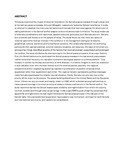| dc.description.abstract | This study examined the impact of external interests on the Somali peace processes through a close look at the last two peace processes, Arta and Mbagathi, respectively hosted by Djibouti and Kenya. It made an attempt to establish the main external factors and interests that had ruled against the attainment of lasting settlement in the Somali conflict despite various initiatives made to this end. The study made use of extensive consultations with diplomats, academicians and politicians; both Somalis and non- Somalis, and reviewed vast literature on the subject of study.
The study found out that there are layers of 'external actors who took an interest in the conflict or in its management acting out of security, geopolitical, cultural, economic and humanitarian concerns. The relationship between the conflicting parties and their sponsors abroad, colonial relations, weapons, aid resources, the issue of terrorism are, among other things, identified as some of the factors that internationalized, exacerbated and prolonged the conflict.
The study attributes the shortcomings in the Somali peace process to three major factors; First, the Somali factions who dominated the Somali peace processes in the last several years posses neither functional hierarchy nor represent a coherent ideological position or political platform.
They multiply in number by the day and continue to shift alliances. It is hard to imagine to work out a solution in such situation even with the best intentions of the external parties; secondly, the regional competitions within neighboring states has resulted in proliferation of parallel initiatives which supplanted rather than supplement each other.
The regional tension replicated by political cleavages inside Somalia exacerbated the volatile internal situation; thirdly, Somalia remains very low on the priority of the major world powers. The peace building objectives of the United States and the European Union -if there are any-are weak and heavily reliant on IGAD which is divided among itself and has no resources and leverage in terms of carrots and sticks to induce a settlement in the Somali conflict.
The study recommends that the Somali leaders seek credibility and legitimization from within the country not from outside and through external patronage. It also urges IGAD to push ahead the consensus that apparently emerged within the sub-region towards the Somali peace process in the last part of the Nairobi talks. This unprecedented cooperation has created a new momentum and hope for both Somalis and international community and needs to be consolidated. | en |

